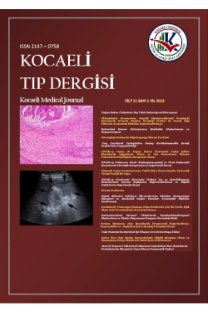Kemoterapinin Neden Olduğu Saç Dökülmesinin Engellenmesinde Saçlı Deri Soğutma Yönteminin Etkinliği ve Güvenilirliği
Effectiveness and Reliability of Scalp Cooling in Preventing Hair Loss Caused by Chemotherapy
___
- 1. Power S, Condon C. Chemotherapy-induced alopecia: a phenomenological study. Cancer Nursing Practice. 2008; 7(7): 44-47 DOI: 10.7748/cnp2008.09.7.7.44.c6682
- 2. Kargar, M., Sarvestani, R.S., Khojasteh, H.N. Heidari, M.T. Efficacy of penguin cap as scalp cooling system for prevention of alopecia in patients undergoing chemotherapy. Journal of Advanced Nursing. 2011;67: 2473–2477 PMID: 21635283 DOI: 10.1111/j.1365-2648.2011.05668.x
- 3. Roe, H. Chemotherapy-induced alopecia: Advice and support for hair loss. British Journal of Nursing 2011; 20:4– 11 PMID: 21647004 DOI: 10.12968/bjon.2011.20.Sup5.S4
- 4. Tierney AJ, Taylor J, Closs SJ. Knowledge, expectations and experiences of patients receiving chemotherapy for breast cancer. Scand Journal Caring. 1992; 6:75–80 PMID: 1641535 DOI: 10.1111/j.1471-6712.1992.tb00128.x
- 5. Kadakia KC, Rozell SA, Butala AA, Loprinzi CL. Supportive cryotherapy: a review from head to toe. J Pain Symptom Manage. 2014;47(6):1100-15. PMID: 24210702 PMCID: PMC4013268 DOI: 10.1016/j.jpainsymman.2013.07.014
- 6. Grevelman E.G, Breed W.P.M. Prevention of chemotherapy-induced hair loss by scalp cooling. Annals of Oncology. 2005; 16: 352–358 PMID: 15642703 DOI: 10.1093/annonc/mdi088
- 7. C J G van den Hurk, L V van de Poll-Franse, W P M Breed, J W W Coebergh, J W R Nortier. Scalp cooling to prevent alopecia after chemotherapy can be considered safe in patients with breast cancer. Breast. 2013;22(5):1001-4 PMID: 23973267 DOI: 10.1016/j.breast.2013.07.039
- 8. Nangia J, Wang T, Osborne C, Niravath P, Otte K, Pappish S et al. Effect of a scalp cooling device on alopecia in women undergoing chemotherapy for breast cancer: the SCALP randomized clinical trial. JAMA. 2017; 317: 596–605 PMID: 28196254 DOI: 10.1001/jama.2016.20939
- 9. Rugo HS, Klein P, Melin SA, Hurvitz SA, Melisko ME, Moore A et al. Association between use of a scalp cooling device and alopecia after chemotherapy for breast cancer. JAMA. 2017; 317:606–14 doi:10.1001/jama.2016.21038
- 10. Betticher DC, Delmore G, Breitenstein U, Anchisi S, Zimmerli-Schwab B, Müller A et al. Efficacy and tolerability of two scalp cooling systems for the prevention of alopecia associated with docetaxel treatment. Support Care Cancer. 2013; 21: 2565–73 doi:10.1001/jama.2016.21038
- 11. Chan A, Bauwens A, Pontre S, Jackson S, McGlone F, Ernenweine T et al. Efficacy of scalp cooling in reducing alopecia in early breast cancer patients receiving contemporary chemotherapy regimens. Breast 2018; 41: 127–32 PMID: 30048865 DOI: 10.1016/j.breast.2018.07.006
- 12. Vasconcelos I, Wiesske A, Schoenegg W. Scalp cooling successfully prevents alopecia in breast cancer patients undergoing anthracycline/taxane-based chemotherapy. Breast 2018; 40:1–3 PMID: 29660543 DOI: 10.1016/j.breast.2018.04.012
- 13. Rice BA, Ver Hoeve ES, DeLuca AN, Esserman LJ, Rugo HS, Melisko ME et al. Registry study to assess hair loss prevention with the Penguin. Breast Cancer Res Treat 2018 ;167(1):117-122 PMID: 29660543 DOI: 10.1016/j.breast.2018.04.012
- 14. Van den Hurk CJ, Peerbooms M, van de Poll-Franse LV, Nortier JW, Coebergh JW, Breed WP. Scalp cooling for hair preservation and associated characteristics in 1411 chemotherapy patients–results of the Dutch Scalp Cooling Registry. Acta Oncol. 2012; 51:497–504 PMID: 22304489 DOI: 10.3109/0284186X.2012.658966
- 15. Smetanay K, Junio P, Feißt M, Seitz J, Hassel JC, Mayer L et al. COOLHAIR: a prospective randomized trial to investigate the efficacy and tolerability of scalp cooling in patients undergoing (neo)adjuvant chemotherapy for early breast cancer. Breast Cancer Res Treat. 2019; 173:135–43. PMID: 30255454 DOI: 10.1007/s10549-018-4983-8
- 16. Kinoshita T, Nakayam T, Fukuma E, Inokuchi M, Ishiguro H, Ogo E et al.Efficacy of Scalp Cooling in Preventing and Recovering From Chemotherapy-Induced Alopecia in Breast Cancer Patients: The HOPE Study. Front Oncol. 2019; 9: 733 PMID: 31448235 doi: 10.3389/fonc.2019.00733
- 17. Kruse M, Abraham J. Management of Chemotherapy Induced Alopecia With Scalp Cooling. Journal of Oncology Practice. 2018(14); 3: 149-154 PMID: 29529389 DOI: 10.1200/JOP.17.00038
- 18. Forsberg SA. Scalp cooling therapy and cytotoxic treatment. Lancet. 2001; 357: 1134 DOI:https://doi.org/10.1016/S0140-6736(00)04293-8
- 19. Grevelman EG, Breed WP. Prevention of chemotherapy-induced hair loss by scalp cooling. Ann Oncol. 2005; 16: 352–8 PMID: 15642703 DOI: 10.1093/annonc/mdi088
- 20. Ron IG, Kalmus Y, Kalmus Z, Inbar M, Chaitchik S. Scalp cooling in the prevention of alopecia in patients receiving depilating chemotherapy. Support Care Cancer. 1997; 5: 136–8. PMID: 9069614 DOI: 10.1007/BF01262571
- 21. Parker R. The effectiveness of scalp hypothermia in preventing cyclophosphamide-induced alopecia. Oncol Nurs Forum. 1987; 14: 49–53 PMID: 3697290
- 22. Van Den Hurk CJG, Breed WPM, Nortier JWR. Short post-infusion scalp cooling time in the prevention of docetaxel-induced alopecia. Support Care Cancer. 2012; 20: 3255–60 PMID: 22539051 DOI: 10.1007/s00520-012-1465-0
- ISSN: 2147-0758
- Başlangıç: 2012
- Yayıncı: -
Mehmet ÜNAL, Tomris DUYMAZ, İbrahim Halil URAL, Mehmet Tolgahan HAKAN
Alkol Bağımlılığı olan Hastalarda Komorbid Psikiyatrik Tanı ve Klinik Paremetreler ile İlişkisi
Farklı Yaş Grubundaki Sıçanlarda Laparaskopik ve Açık Cerrahi Sonrası Hücresel İmmun Yanıt
Ünal BIÇAKÇI, Tunç FIŞGIN, Rıza RIZALAR, Tülin ÖZTAŞ
Akut Pankreatitte Oksidatif Stres ve Enflamasyon Biyobelirteçleri
Ömer Faruk ÖZER, Abdurrahim KOÇYİĞİT, Mehmet YİĞİT, Şehabettin SELEK, Eray Metin GÜLER, Kübra BOZALİ, Eda YİĞİT
Karbonmonoksit Zehirlenmelerinde Klinik Semptomların Biyokimyasal Parametrelerle Değerlendirilmesi
Handan ÇİFTÇİ, Ömer ÇANACIK, İlksen DÖNMEZ, Hüseyin Fatih GÜL, Turgut DOLANBAY
Metotreksat İlişkili Pansitopeni ve Mukokütanöz Toksisite
Esra TERZİ DEMİRSOY, Ceren ERDOĞAN EROĞLU
Veysel HAKSÖYLER, Ertuğrul BAYRAM, Mehmet Ali ÇAPARLAR, Tolga KÖSECİ, Plat OLGUN
Gebe Olan ve Olmayan Kadınlarda Koronavirüs-19 Fobisinin Karşılaştırılması
Selma ŞEN, Pakize Özge KARKIN, Gözde SEZER, Müberra DURAN
Deliryum ile Ortaya Çıkan Serebral Amiloid Anjiopati İlişkili Subaraknoid Kanama
Akromegali Hastalarında Hematolojik İndeksler ve Tedavi ile İlişkisi
Berrin ÇETİNARSLAN, Zeynep CANTÜRK, İlhan TARKUN, Adnan BATMAN, Özlem Zeynep AKYAY, Alev SELEK
